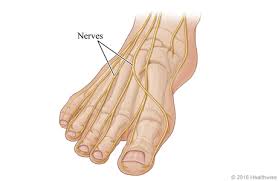In the realm of medical diagnostics, nerve conduction studies (NCS) play a vital role in evaluating the function and health of nerves. This guide aims to provide a comprehensive understanding of nerve conduction studies, their importance, and their relationship to conditions such as neuropathy and diabetes.
What Is a Nerve Conduction Study?
A nerve conduction study, often abbreviated as NCS, is a test used to assess the health of your nerves and how well they can send electrical signals. By stimulating a nerve with a small electrical impulse, doctors can measure the speed and strength of the signal as it travels down the nerve. The results help in diagnosing various conditions affecting the nerves.
NCS Medical Abbreviation and Related Terms
While navigating the world of medical diagnostics, you might encounter terms like "NCS" (nerve conduction study) and "NCV" (nerve conduction velocity). Both refer to the same type of test, focusing on assessing nerve function. Another related test you might hear about is the EMG NCS test, which combines electromyography (EMG) with nerve conduction studies to provide a more comprehensive view of nerve and muscle health.
Why Are Nerve Conduction Studies Conducted?
Diagnosing Nerve Conditions
Nerve conduction studies are primarily used to diagnose conditions that affect the peripheral nerves, such as:
-
Neuropathy: A condition often seen in diabetic patients, where nerves are damaged, leading to pain, tingling, or numbness, especially in the legs and feet.
-
Carpal Tunnel Syndrome: A condition where the median nerve is compressed, causing pain and weakness in the hand.
-
Radiculopathy: Also known as a pinched nerve, usually in the spine, leading to pain and weakness.
Understanding Nerve Health
An NCS can determine if a nerve is damaged and, if so, how severely. It can also help in deciding the best course of treatment, whether it's medication, physical therapy, or surgery.
 The Nerve Conduction Test Procedure
The Nerve Conduction Test Procedure
Preparation and What to Expect
The nerve conduction test is usually performed in a hospital or a specialised clinic. Here’s what you can expect:
-
Preparation: You may be asked to avoid lotions or creams on the skin where the electrodes will be placed. Wear comfortable clothing that allows easy access to the test area.
-
During the Test: Small electrodes are placed on the skin over the nerve being tested. A mild electrical impulse is sent through the nerve, and the response is recorded. You might feel a tingling sensation, but it’s not painful.
-
Duration: The test typically takes 30 to 90 minutes, depending on the number of nerves being tested.
How to "Fail" a Nerve Conduction Test
While no one aims to fail a medical test, concerns about the procedure's outcome are common. Nerve conduction tests are objective measures; hence, factors like anxiety or stress do not affect the results. The test's accuracy is crucial for diagnosing and treating nerve-related conditions effectively.
Interpreting Nerve Conduction Test Results
The results of a nerve conduction study can indicate how well your nerves are functioning. Here’s what doctors look for:
-
Normal Results: Indicate that your nerves are functioning correctly.
-
Abnormal Results: May suggest nerve damage due to conditions like neuropathy or carpal tunnel syndrome. The speed and strength of the nerve signal can indicate the severity of the damage.
Nerve Conduction Studies and Diabetes
Diabetes is a common cause of neuropathy, a condition that nerve conduction studies are frequently used to diagnose. Elevated blood sugar levels can damage nerves over time, leading to symptoms like numbness, tingling, and pain, especially in the feet and legs.
Diabetic Footwear: A Complementary Solution
For those diagnosed with diabetic neuropathy, wearing appropriate footwear is essential. Diabetic shoes are designed to provide:
-
Support: Reducing pressure on the feet and preventing ulcers.
-
Comfort: Accommodating any foot deformities and improving mobility.
When choosing shoes for diabetes or neuropathy, look for features like a wide toe box, cushioned insoles, and supportive arches to ensure a good fit and prevent further nerve damage.
Choosing the Right Footwear for Nerve Health
Whether or not you have diabetes, wearing the right shoes is crucial for maintaining nerve health. Here’s what to consider:
-
Comfortable Shoes: Look for shoes with ample cushioning to absorb shock and reduce stress on your feet.
-
Good Fit Shoes: Ensure that your shoes fit well and do not cause any pressure points that could lead to nerve damage.
-
Shoes for Neuropathy: For those with existing nerve issues, specialised neuropathy footwear can offer additional support and protection.
Conclusion
Understanding nerve conduction studies and their significance in diagnosing nerve-related conditions is essential for managing your health effectively. If you suspect nerve damage or have conditions like diabetes that could affect your nerves, a nerve conduction study might be a necessary step in your healthcare journey. Additionally, selecting the right footwear can play a significant role in maintaining nerve health and preventing complications.
By being informed about nerve conduction studies and making conscious footwear choices, you can take proactive steps towards preserving your nerve health and overall well-being. Always consult with a healthcare professional for personalised advice and treatment options.








